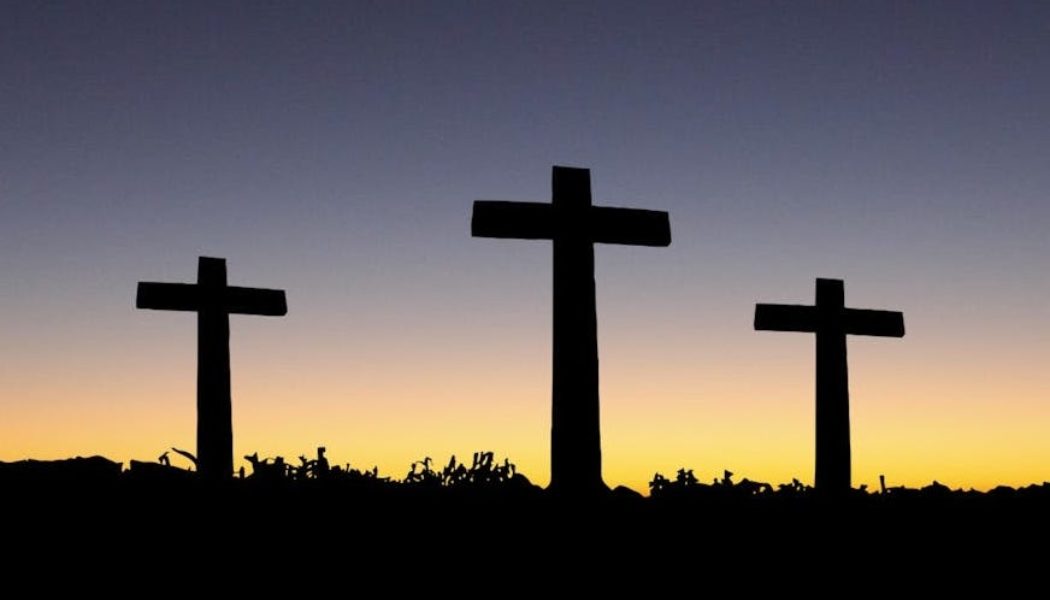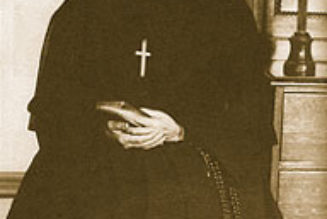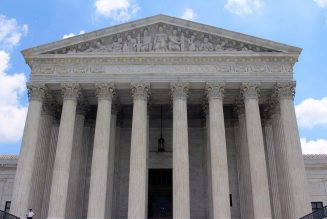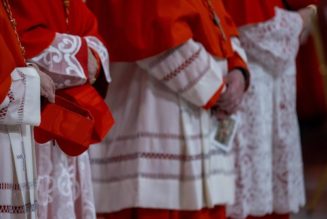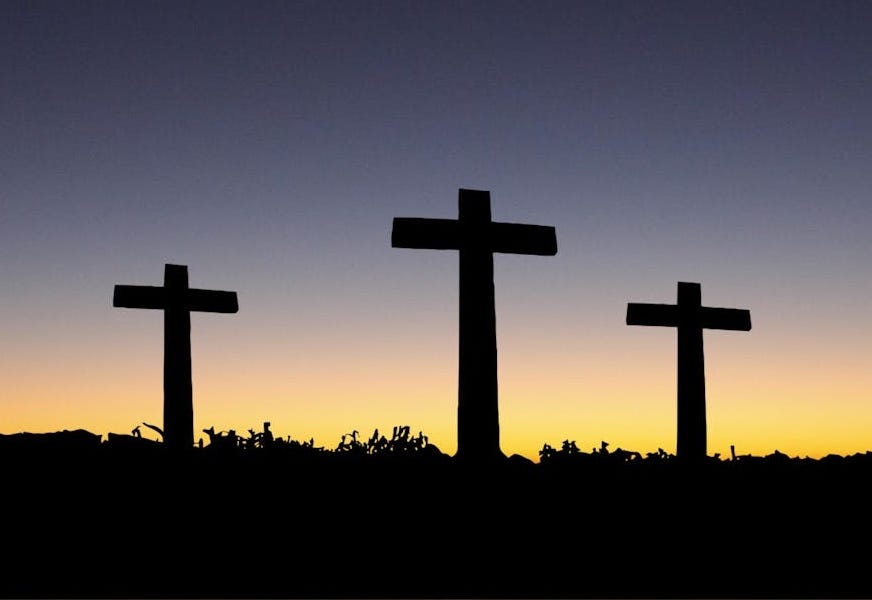
Let’s start with a simple fact: Man’s oldest and most persistent sin is idolatry. And if the human story teaches us anything, it’s that idolatry has an infinite wardrobe of disguises—and an endless number of victims. In the modern era, the go-to idol is the state, usually in the liturgical vestments of science.
The Third Reich euthanized some 300,000 mentally and physically disabled persons. Then it killed another 6 million Jews, Gypsies, social outcasts, and political prisoners in the name of Aryan racial superiority. The political heirs of Karl Marx (Lenin, Stalin, Mao, Pol Pot, and others) murdered 25 million people in the Soviet bloc; 40 million in China; 2 million in a nation of just 7 million in Cambodia; and millions more elsewhere—all to create a new world and restart history from “Year Zero,” cleansed of any memory of the past, and based on a model of man as his own master; humanity as the real and only god.
The body count from the last hundred years is both well documented and painful to revisit. We’ve learned—or at least we think we’ve learned—an important lesson. And the lesson is this: Any political party or ideology that claims to create a new kind of man, a self-sustaining, self-redemptive humanity, is a fraud. It’s just the latest installment in a very old gnostic fairy tale. Gnosticism grew up alongside Christianity, sometimes intertwining with it; and the modern gnostic zealot, whether he calls himself a fascist, a Nazi, a Marxist, or even a certain brand of “progressive,” is never really irreligious. And he’s certainly not an “unbeliever,” even when he says he is. He’s a particular kind of believer; a man convinced he has the secret knowledge, the gnosis, that unlocks the power to fix a broken world. And he clings to that sacred knowledge just as religiously as any 14th century monk clung to his Bible.
The difference, of course, is that the God of the monk was—and is—true. The god of the gnostic isn’t. Each new version of the gnostic zealot dresses up his little godling in new language with new tools of coercion. But underneath, it’s always the same idolatrous lie. Man is not a god, and there’s no secret knowledge that can make him so.
But if that’s so, why would anyone believe in a regime of lies? Why would people swallow toxic nonsense like Marxist economics or Nazi racism? The answer is that most people, being reasonably intelligent, don’t believe in a system based on deceit. But that doesn’t stop them from complying with it. They’re weak, or intimidated, or despairing, or just too lazy to speak the truth until it’s too late to make a difference. Many people—probably most people—will try to live as normally as they can, for as long as they can, no matter what the nature of their political and cultural environment. Most Russians weren’t Bolsheviks. Most Germans weren’t Nazis. But they went along to get along. They did what they needed to do in order to survive, while the world went dark around them.
The good news is that our country was created to be a different and better place. It was designed to be, and always has been, an experiment in ordered liberty, a mix of biblical realism and Enlightenment hopes. It has never been perfect. Nothing human ever is. But in so many ways, it actually works. And it’s worth fighting for. We have the kind of laws and freedoms, the public institutions and civic consciousness, which ensure that things like the murderous obsessions that ruined the last century can never happen here.
Or at least, that’s what we think. The not-so-good news is that we can lose everything we have. As Solzhenitsyn once said, “prosperity breeds idiots.” The proof is in our current political terrain, and especially in the leaders who now shape it.
A friend of mine likes to say that our current political reality boils down to “narcolepsy for the masses”: narcolepsy as policy and narcolepsy by design; in other words, a populace permanently half asleep and thus easily molded and led. That may sound odd. But it’s really just a variant on what the media scholar Neil Postman wrote in Amusing Ourselves to Death, and what the social historian Christopher Lasch said in The Revolt of the Elites and the Betrayal of Democracy. Neither Postman nor Lasch, by the way, came from the political right. Both men were very rational voices on the democratic left. And both men saw that so much of our current culture is actually based on weakening rather than strengthening the individual; creating dependence rather than real autonomy.
As a result, in the end, we get a stupefied populace of narcoleptics addicted to trash media, materialist junk, fast food, and the internet. In other words, people unable to think, who need to be ruled—and surveilled, for everyone’s safety—by (allegedly) smart other people . . . which is the exact opposite of what our public life was designed by the Founders to require. It’s also uncomfortably close to the world C.S. Lewis worried about in The Abolition of Man. That’s where we are now.
So what do we do about it?
I borrowed this article’s title, “On the Power of the Powerless,” from one of the great essays of the last century. Václav Havel, the playwright and political dissident, wrote “The Power of the Powerless” in 1978 at the height of communist repression in his native Czechoslovakia. The content is brilliant, but Havel’s main point is very simple: Even in a world of persecution and state control, the individual is never really powerless. He or she always has the power to say no, to refuse to believe lies, and to search out other people who share a love for truth and are willing to suffer for it.
Havel was never religious. But his friend and fellow Czech dissident, Václav Benda, was. And Benda’s the man whose example I want us to remember in the coming weeks and months. Especially in yet another election year.
A husband and father of six, Benda—when he was pressed in the 1970s to join the Communist Party for professional reasons—declined. It killed his career. He was hounded out of academia. He was forced from one menial job after another. He was harassed for his peaceful resistance activities, which were technically legal under Czechoslovak law. He was arrested and jailed for four years. But none of it deterred him. He and his family had a profound Catholic faith, and they lived it intensely. At Easter in 1985, in the midst of all his political problems and government bullying, Benda wrote an extraordinary defense of Catholic teaching on divorce, contraception, and abortion (collected here)—this, despite knowing that part of the Czech Church was collaborating with the regime, and some of her leaders were both corrupt and cowards.
Through it all, he never lost his gratitude for the beauty of his family and the gift of his faith. Nor did he lack a sense of humor about his own sufferings. At the height of his government troubles, he wrote that “I consider it extremely unreasonable, once you’ve shown some eccentric willingness to throw yourself to the lions, to complain that their teeth are not very clean.”
All of this man’s energy, creativity, and courage flowed out of one source: his identity and fidelity as a believing Catholic layman—the vocation which began at his baptism and shaped his whole life. Which is why, even in his prison cell, Václav Benda was a free man; free in a way his persecutors could never be.
For us American Catholics, the truths of our faith have been easy to learn, easy to affirm, and too often easy to forget, for the last six decades. The Church in our country has enjoyed a fairly free and comfortable life for a long time. And a great deal of good has been done. It’s still being done by good people in every American diocese and parish. We should be grateful and proud for all that God has made possible, and our place in helping to achieve it. But if the hatred unleashed by the 2022 Supreme Court decision that struck down Roe v. Wade teaches us anything, it’s that our comfortable times—the go along and get along times—are over. What we need now is to think and act accordingly. We need to recover the spine and the missionary nature of our baptism.
If Václav Benda, and others like him, could speak and work for the truth with far fewer resources and in circumstances infinitely harder than our own . . . then surely we can do at least as much, no matter how difficult our own world becomes. So this isn’t a bad time to be a Christian. It’s exactly the best time, because it’s our time to prove that we really do believe what we claim to believe, by preaching it with the witness of our lives.
Jesus said, “I am the light of the world.” He’s the only true light of the world. So we are not powerless; we’re never powerless; because we’ve been baptized into the Cross of the God who loves us.
And if God is with us, who can be against us?
+Charles Chaput, a Capuchin Franciscan, is the archbishop emeritus of Philadelphia. This essay is adapted from comments given to Tulsa’s Alcuin Institute in 2022.
